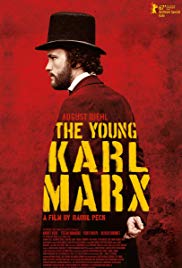
THE YOUNG KARL MARX
France/Germany, 2017, 118 minutes, Colour.
August Diehl, Stefan Konarske, Vicki Krieps, Olivier Gourmet, Hannah Steele.
Directed by Raoul Peck.
Probably a film about an older Karl Marx might not be all that interesting, the ageing thinker and writer in London, in a kind of exile, sitting in the British Library, writing Das Kapital. So, if he is to be acknowledged in the cinema, then it is definitely best to go for young Karl Marx.
Interestingly, the film is very strong in its depiction of Marx’s friend and co-writer, Friedrich Engels, probably a character more suited to a film than Marx.
The setting is the 1840s, a decade of social unrest, and a decade in which a number of established monarchs and leaders fell and, in 1848, revolutionary leaders emerged – as well as in the culmination of this film, the Communist Manifesto.
The locations are quite varied, from Germany, in the city of Frankfurt, in France in Paris, in Belgium in Brussels and, in England, some significant scenes in mill-factory in Manchester as well as other British locations for socially-concerned meetings.
Marx, as played by August Diehl, is a genial young fellow in his 20s, easily stirred by social injustice, and, not having a comfortable background, having a great empathy for people in poor circumstances and dire straits. He writes articles, the authorities close down his magazine and the editor and staff find themselves temporarily in jail. Which means that Marx has to move on, going to Paris and writing and thinking, and the same in Belgium. He is strongly supported by a young woman from a more wealthy Frankfurt family, Jenny (Vivki Krieps), whom he marries and who is consistent in her belief in her husband and his ideas. He also becomes a family man.
In the meantime, the German Friedrich Engels is in Manchester at one of the mills with his father, an enterprising capitalist who is hard on the workers and intolerant of any outspoken objectors, taking no notice of the injuries and the harsh mill conditions. One of the most vociferous is a young woman, Mary (Hannah Steele). Engel seeks out the workers because he wants to do research work on the conditions. They are initially suspicious, physically assaulting him, but he is saved by Mary who will later become his wife and his most ardent supporter.
Marx and Engels know each other and admire each other’s writings. When they eventually meet, there is a strong collaboration, lots of writing, encounters with significant social writers of the time, especially Proudhon (Olivier Gourmet). As the 1840s go on, Marx and Engels disagree with and are able to oust his followers, Engels demanding to speak and being persuasive so that the leaders of the Justice E allow Engels to be the official delegate and to speak.
In the meantime, Marx, supporting Engels, is finding it hard to make ends meet, is becoming tired, wants to retire from public appearances and to write. Engels meanwhile is fired up and is finally able to persuade Marx to write the draft of The Communist Manifesto.
Audiences will have varied views on this film depending on their admiration or not for Marx and Engels and their perspective on the subsequent history of communism. But the film does offer the opportunity to see the two men and their story, and their action, and their eagerness
1. Audience interest in Karl Marx, his life and writings, influence, Communism? The Communist Manifesto?
2. The director, his career, interest in Marx and Communism? The strong cast, German, Belgian, British?
3. Re-creation of the period, the 19th century, 1840s, the locations, the German cities, Paris, Brussels, Manchester and mills, London and meetings? Costumes, decor? Poor areas of the cities, homes, meeting places, the Manchester mills? The sense of the decade?
4. The portrait of Marx in his 20s, his vitality, exuberance, yet stepping back, writing, thinking, wanting to write on reality rather than theory? His personality, cheerful, at meetings, intervening, his love for Jenny, the baby, the work of the nanny? From Germany to Paris? The meetings and discussions with Proudhon? Friendship? Going to Brussels? The editor, magazines banned, being taken to prison, new magazines? Publication of views, sense of freedom? Jenny and her wealthy background, supporting her husband, not wanting to be bored in living a leisurely life?
5. The comparison with Friedrich Engels, his father in the mill, wealth, Manchester? His father addressing the workers, oppressive attitudes, Mary and her speaking up, being dismissed, leaving with her sister, Lizzie? Friedrich walking out on his father? The enquiries, finding the workers, being punched? His wanting to do research, the stories, publication?
6. Marx and Engels, their admiration? Kindred spirits, kindred age, the combined efforts, Engels and his finance, supporting causes and Marx?
7. The League of Justice, Europewide, hopes, the visit, the hearing, discussions, opinions, reactions and their being accepted into the league? The invitation to Proudhon?
8. The league and its meeting, the issue of delegates, Engels claiming to be the delegate, the new vote, being accepted, his speech, the theory that life was battle, the Industrial Revolution creating the proletariat, the bourgeois domination of the proletariat – always combat?
9. Mary, marrying Engels, but not having any children – but perhaps with Lizzie later, Jenny’s surprised reaction? Mary and her vociferous support at meetings? The meetings, the boats, the Proudhon group being rejected, leaving?
10. 1848, the governments, the revolutions, elections, falls of government?
11. The urgency of doing a pamphlet, a kind of catechism on Communism, Marx being tired, and willing, poor, Engels and his enthusiasm? The preparation of the Communist Manifesto, the film quoting, the sense of urgency?
12. The significance of Marx and Engels, Marx and The Communist Manifesto, Das Kapital, unfinished but spending the rest of his life writing?
13. The end and the historical collage up to the present, power and revolutions? And Bob Dylan’s singing?